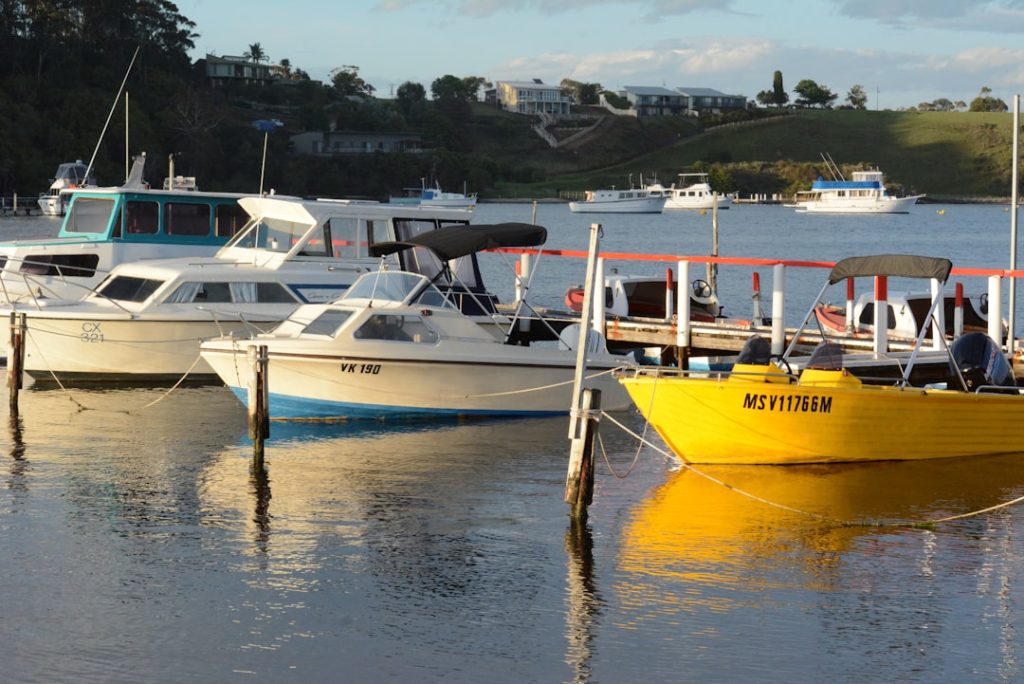Purchasing a used pontoon boat can be an excellent decision for both novice and experienced boaters alike. One of the most significant advantages is the cost savings associated with buying pre-owned. New pontoon boats can carry hefty price tags, often ranging from $20,000 to over $100,000 depending on size and features.
In contrast, a used pontoon boat can provide substantial savings, allowing buyers to acquire a quality vessel for a fraction of the original price. This financial flexibility can enable buyers to allocate funds toward upgrades, maintenance, or even additional accessories that enhance the boating experience. Moreover, buying a used pontoon boat often means that the initial depreciation has already occurred.
New boats typically lose value rapidly within the first few years of ownership, which can be a significant concern for buyers. By opting for a used model, purchasers can avoid this steep depreciation curve, ensuring that their investment retains more of its value over time. Additionally, many used pontoon boats come equipped with features and accessories that may not be included in new models, providing buyers with added value without the extra cost.
Key Takeaways
- Buying a used pontoon boat offers cost savings and value compared to new models.
- Key factors include boat condition, age, brand reputation, and included features.
- Reliable sellers can be found through reputable dealers, online marketplaces, and boating communities.
- Thorough inspection of the hull, engine, and accessories is essential to ensure quality and avoid costly repairs.
- Proper maintenance and understanding financing options help maximize enjoyment and longevity of your used pontoon boat.
Factors to Consider When Searching for a Quality Used Pontoon Boat
When embarking on the journey to find a quality used pontoon boat, several critical factors should be taken into account. First and foremost is the boat’s condition. Buyers should assess the overall state of the vessel, including the hull, engine, and interior.
A thorough inspection can reveal potential issues such as leaks, corrosion, or mechanical problems that could lead to costly repairs down the line. It is advisable to request maintenance records from the seller to gain insight into how well the boat has been cared for over its lifespan. Another essential factor is the boat’s size and layout.
Pontoon boats come in various lengths and configurations, catering to different needs and preferences. Buyers should consider how they plan to use the boat—whether for leisurely family outings, fishing trips, or entertaining friends—and choose a model that accommodates those activities. Additionally, the number of passengers the boat can comfortably hold is crucial; ensuring that it meets your social and recreational needs will enhance your overall experience on the water.
Where to Find Reliable Dealers and Sellers of Used Pontoon Boats

Finding reliable dealers and sellers is paramount when searching for a used pontoon boat. One of the most trusted avenues is through established marine dealerships that specialize in pre-owned boats. These dealers often provide warranties or guarantees on their inventory, offering peace of mind to buyers.
They typically have knowledgeable staff who can assist with questions regarding specific models and their features, as well as provide insights into local waterways and boating regulations. Online marketplaces have also become increasingly popular for purchasing used pontoon boats. Websites such as Boat Trader, Craigslist, and Facebook Marketplace allow buyers to browse a wide selection of listings from private sellers and dealers alike.
However, caution is advised when using these platforms; it is essential to verify the legitimacy of sellers and thoroughly inspect any boat before finalizing a purchase. Engaging in local boating forums or social media groups can also yield valuable recommendations for reputable sellers in your area.
How to Inspect a Used Pontoon Boat for Quality and Value
| Inspection Area | Key Metrics | What to Look For | Acceptable Condition |
|---|---|---|---|
| Hull and Pontoons | Material, dents, corrosion, leaks | Check for cracks, dents, corrosion, and signs of leaks or repairs | Minor cosmetic dents, no leaks or structural damage |
| Engine | Hours of use, maintenance records, starting condition | Verify engine hours, listen for unusual noises, check for smooth start and operation | Engine starts easily, runs smoothly, maintenance up to date |
| Electrical System | Battery condition, wiring integrity, functionality of lights and gauges | Test all electrical components, inspect wiring for corrosion or damage | All electrical systems operational, no exposed or corroded wiring |
| Deck and Furniture | Condition of flooring, seats, upholstery | Look for water damage, tears, stains, and secure fittings | Clean, no major damage, seats firmly attached |
| Steering and Controls | Responsiveness, wear on cables and controls | Check steering smoothness and control responsiveness | Steering is smooth, controls responsive without excessive play |
| Safety Equipment | Life jackets, fire extinguisher, horn, navigation lights | Verify presence and condition of required safety gear | All required safety equipment present and functional |
| Trailer (if included) | Tire condition, lights, brakes, frame integrity | Inspect tires for wear, test lights and brakes, check for rust or damage | Tires with good tread, lights and brakes working, no structural damage |
Inspecting a used pontoon boat requires a keen eye and attention to detail to ensure that you are making a sound investment. Start with a visual inspection of the hull for any signs of damage or wear. Look for scratches, dents, or signs of repair that could indicate previous accidents or neglect.
Pay particular attention to the pontoons themselves; they should be free from significant dents or corrosion that could affect buoyancy and performance. Next, examine the engine and mechanical components. If possible, request a test drive to assess how the boat handles on the water.
Listen for any unusual noises from the engine and observe how smoothly it accelerates and maneuvers. Additionally, check all electrical systems, including lights, pumps, and navigation equipment, to ensure they are functioning correctly. A thorough inspection will help you gauge whether the asking price reflects the boat’s true condition and value.
Tips for Negotiating the Best Price for a Used Pontoon Boat
Negotiating the price of a used pontoon boat can be an intimidating process, but with preparation and strategy, buyers can secure a favorable deal. Start by conducting thorough research on comparable models in similar condition to establish a baseline price range. This information will empower you during negotiations and provide leverage if you encounter an inflated asking price.
When engaging with the seller, approach negotiations with respect and professionalism. Begin by expressing genuine interest in the boat while also highlighting any concerns discovered during your inspection. This tactic can create an opening for negotiation by demonstrating that you are informed about potential issues that may warrant a lower price.
Be prepared to walk away if the seller is unwilling to meet your budget; sometimes, this can prompt them to reconsider their position.
The Importance of Proper Maintenance and Care for a Used Pontoon Boat

Once you have successfully purchased a used pontoon boat, understanding the importance of proper maintenance is crucial for ensuring its longevity and performance. Regular upkeep not only preserves the boat’s aesthetic appeal but also prevents costly repairs down the line. Key maintenance tasks include routine cleaning of both the interior and exterior surfaces to prevent mold and mildew buildup, as well as regular inspections of mechanical components such as the engine and electrical systems.
Additionally, seasonal maintenance is vital for pontoon boats that are stored during winter months. This includes winterizing the engine by draining fluids and adding antifreeze to prevent freezing damage. Proper storage techniques—such as using a quality cover—can protect against environmental elements that may cause wear over time.
By committing to regular maintenance practices, owners can enjoy their pontoon boat for many years while maximizing its resale value should they choose to upgrade in the future.
Financing Options for Purchasing a Used Pontoon Boat
Financing options play a significant role in making a used pontoon boat more accessible to potential buyers. Many financial institutions offer loans specifically tailored for recreational vehicles, including boats. These loans typically come with competitive interest rates and flexible repayment terms that can accommodate various budgets.
Before applying for financing, it is advisable to check your credit score; a higher score can lead to better loan terms. In addition to traditional bank loans, buyers may also explore financing options through marine dealerships that often have partnerships with lenders specializing in boat loans. These dealerships may offer promotional financing rates or incentives that make purchasing more affordable.
Furthermore, some sellers may be open to owner financing arrangements where buyers make payments directly to them over time; this option can be beneficial for those who may not qualify for traditional loans.
Enjoying Your New-to-You Pontoon Boat: Tips for Getting the Most Out of Your Purchase
Once you have acquired your used pontoon boat, it’s time to maximize your enjoyment on the water. Familiarize yourself with all features and systems onboard; understanding how everything works will enhance your boating experience significantly. Consider taking a boating safety course if you are new to operating vessels; this knowledge not only ensures your safety but also enhances your confidence while navigating waterways.
Planning outings with family and friends can create lasting memories on your pontoon boat. Whether it’s hosting barbecues on board or organizing fishing trips, these experiences will deepen your appreciation for your investment. Additionally, joining local boating clubs or online communities can provide opportunities for socializing with fellow enthusiasts while sharing tips and advice about maintenance and local boating spots.
Embracing these aspects will ensure that your new-to-you pontoon boat becomes a cherished part of your recreational lifestyle.


